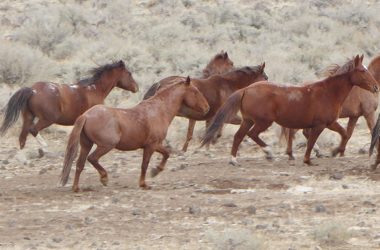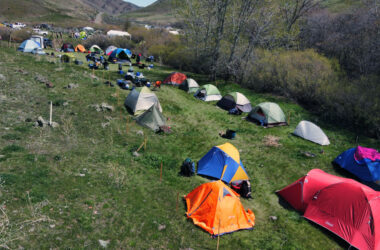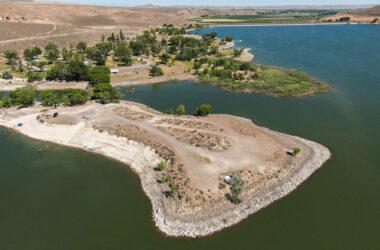A nonprofit made up of ranchers and the U.S. Bureau of Land Management received nearly $500,000 in grant funding to continue efforts to curb the growing horse population in Malheur County for the next four years.
Federal officials anticipate rounding up wild horses and administering fertility controls over the next 10 years, according to BLM documents. However, according to Shaney Rockefeller, a wild horse specialist with the Vale BLM, the agency must administer booster shots annually.
Rockefeller said those shots would be administered by volunteers with the nonprofit High Desert Strategies. The nonprofit, a collaboration between the federal agency and ranchers, has darted more than 400 animals on the rangeland in Malheur County.
Rockefeller said the organization grew out of a necessity to manage the wild horse population in Malheur County, which, she said, has been doubling every four years.
The county is home to about 1,245 wild horses across nine herd management areas comprising over a quarter million acres of public land. BLM officials calculate the area could sustain up to less than 1,000.
The wild herds are overgrazing native plants, which reduces feed for other wildlife in the area, Rockefeller said.
Wild horses grazing in riparian areas such as streams and rivers can be destructive, according to the specialists. The horses are attracted to riparian areas for water and green grass. However, their year-round presence doesn’t allow recovery from grazing.
When a section of the range is overgrazed, native plants face more competition from invasive weeds, BLM documents note.
Rockefeller said administering fertility treatments is a labor-intensive process in Malheur County given that the animals, unlike the horses in other parts of the country, are not habituated to humans. She said it takes up to 12 people to dart a herd.
Another challenge, she said, is that the holding facilities in the Midwest, where the horses that are not immediately adopted are taken, make up a significant portion of the federal agency’s budget for wild horses.
Given the overpopulation of the animals on the range and the funding constraints, Rockefeller said she “laid it on the line” in 2017 when she approached the ranchers in the area about the collaboration.
“We either do this together, or I’ll go somewhere else because I can’t do this by myself,” she said.
Rockefeller said people in the area have “chipped in” and the collaboration has been successful.
“I’ve been very happy with the teamwork,” she said.
Rachel Amick, volunteer and rancher from Harper, said initially she was skeptical of the darting program.
Amick said the relationship between the ranchers and the BLM had been strained up until that point – largely due to the situation with the wild horses.
She said her family had encountered damage to range fencing, inadequate forage for their cattle and dangerous situations with aggressive studs coming after their family when riding mares.
She said the studs, who can smell the mares from a great distance, have become aggressive and tried to move them into their harems, creating a dangerous situation for her family while herding their cattle.
Now, she said, the population is manageable, and her cattle and horses seem to be doing well.
“It was a team effort,” Amick said. “It was nice that we could work together and find a solution.”
In the last year, Rockefeller said, the organization has seen a culmination of their work from the last few years. The fertility drug takes time to yield results. Rockefeller said in the Cold Springs management area, 25 miles southwest of Harper, the number of mares was down to 60 and the number pregnant was below 10.
That, she said, was a “huge success.”
NEWS TIP? Send an email to [email protected].
SUPPORT OUR WORK – The Malheur Enterprise delivers quality local journalism – fair and accurate. You can read it any hour, any day with a digital subscription. Read it on your phone, your Tablet, your home computer. Click subscribe – $7.50 a month.




